|
|
|
Sort Order |
|
|
|
Items / Page
|
|
|
|
|
|
|
| Srl | Item |
| 1 |
ID:
045976
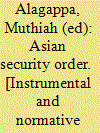

|
|
|
|
|
| Publication |
Standford, Standford University, 2003.
|
| Description |
xxv, 628p.
|
| Standard Number |
080474629X
|
|
|
|
|
|
|
|
|
|
|
|
Copies: C:1/I:0,R:0,Q:0
Circulation
| Accession# | Call# | Current Location | Status | Policy | Location |
| 046980 | 355.03305/ASI 046980 | Main | On Shelf | General | |
|
|
|
|
| 2 |
ID:
058865
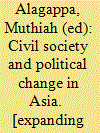

|
|
|
|
|
| Publication |
California, Stanford University Press, 2004.
|
| Description |
xxii, 528p.
|
| Standard Number |
0804750971
|
|
|
|
|
|
|
|
|
|
|
|
Copies: C:1/I:0,R:0,Q:0
Circulation
| Accession# | Call# | Current Location | Status | Policy | Location |
| 049136 | 300.95/ALA 049136 | Main | On Shelf | General | |
|
|
|
|
| 3 |
ID:
061214


|
|
|
|
|
| Publication |
Stanford, Standford University Press, 2001.
|
| Description |
xxv, 594p.
|
| Standard Number |
0804742278
|
|
|
|
|
|
|
|
|
|
|
|
Copies: C:1/I:0,R:0,Q:0
Circulation
| Accession# | Call# | Current Location | Status | Policy | Location |
| 049557 | 322.5095/ALA 049557 | Main | On Shelf | General | |
|
|
|
|
| 4 |
ID:
103995


|
|
|
|
|
| Publication |
2011.
|
| Summary/Abstract |
This article investigates and explains the development of International Relations studies (IRS) in China, Japan, and India. Beginning in early 1980s IRS experienced exponential growth in China and is becoming a separate discipline in that country. Despite early starts, IRS in Japan and India is still an appendage in other disciplinary departments, programs, and centers although growing interest is discernible in both countries. Continued rise of Asian powers along with their growing roles and responsibilities in constructing and managing regional and global orders is likely sustain and increase interest in IRS in these countries and more generally in Asia. Distinctive trajectories have characterized the development of IRS in China, Japan, and India. Distinctiveness is evident in master narratives and intellectual predispositions that have shaped research and teaching of IR in all three countries. The distinct IRS trajectories are explained by the national and international context of these countries as well as the extensiveness of state domination of their public spheres. Alterations in national circumstances and objectives along with changes in the international position explain the master narratives that have focused the efforts of IR research communities. Extensiveness of state domination and government support, respectively, explain intellectual predispositions and institutional opportunities for the development of IRS. IRS in Asia has had a predominantly practical orientation with emphasis on understanding and interpreting the world to forge suitable national responses. That orientation contributed to a strong emphasis on normative-ethical dimensions, as well as empirically grounded historical, area, and policy studies. For a number of reasons including intellectual predispositions and constraints, knowledge production in the positivist tradition has not been a priority. However, IR theorizing defined broadly is beginning to attract greater attention among Asian IR scholars. Initial interest in Western IR theory was largely a function of exposure of Asian scholars to Western (primarily American) scholarship that has been in the forefront in the development of IR concepts, theories, and paradigms. Emulation has traveled from copying to application and is now generating interest in developing indigenous ideas and perspectives based on national histories, experiences, and traditions. Although positivism may gain ground it is not deeply embedded in the intellectual traditions of Asian countries. Furthermore, theorizing in the positivist tradition has not made significant progress in the West where it is also encountering sharp criticism and alternative theories. Asian IR scholarship would continue to emphasize normative-ethical concerns. And historical, area, and policy studies would continue to be important in their own right, not simply as evidentiary basis for development of law-like propositions. It also appears likely that Asian IR scholarship would increasingly focus on recovery of indigenous ideas and traditions and their adaptation to contemporary circumstances. The net effect of these trends would be to diversify and enrich existing concepts, theories, methods, and perspectives, and possibly provide fresh ones as well. The flourishing of IRS in Asia would make the IR discipline more international.
|
|
|
|
|
|
|
|
|
|
|
|
|
|
|
|
| 5 |
ID:
048339
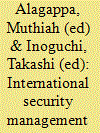

|
|
|
|
|
| Publication |
Tokyo, United Nations University press, 1999.
|
| Description |
vii, 489p.
|
| Standard Number |
9280810014
|
|
|
|
|
|
|
|
|
|
|
|
Copies: C:1/I:0,R:0,Q:0
Circulation
| Accession# | Call# | Current Location | Status | Policy | Location |
| 041477 | 341.523/ALA 041477 | Main | On Shelf | General | |
|
|
|
|
| 6 |
ID:
091632
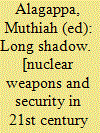

|
|
|
|
|
| Publication |
New Delhi, Oxford University Press, 2009.
|
| Description |
xvi, 571p.
|
| Standard Number |
9780198063599
|
|
|
|
|
|
|
|
|
|
|
|
Copies: C:1/I:0,R:0,Q:0
Circulation
| Accession# | Call# | Current Location | Status | Policy | Location |
| 054477 | 355.0217095/ALA 054477 | Main | On Shelf | General | |
|
|
|
|
| 7 |
ID:
047009
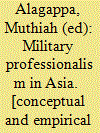

|
|
|
|
|
| Publication |
Honolulu, East-West Center, 2001.
|
| Description |
xi, 227p.
|
| Standard Number |
0866381961
|
|
|
|
|
|
|
|
|
|
|
|
Copies: C:2/I:0,R:0,Q:0
Circulation
| Accession# | Call# | Current Location | Status | Policy | Location |
| 044552 | 355.3095/ALA 044552 | Main | On Shelf | General | |
| 045643 | 355.3095/ALA 045643 | Main | On Shelf | General | |
|
|
|
|
| 8 |
ID:
112560
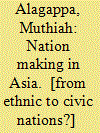

|
|
|
|
|
| Publication |
Malaysia, Institute of Strategic and International Studies (ISIS), 2012.
|
| Description |
iii, 36p.Pbk
|
| Standard Number |
9789679473100
|
|
|
|
|
|
|
|
|
|
|
|
Copies: C:1/I:0,R:0,Q:0
Circulation
| Accession# | Call# | Current Location | Status | Policy | Location |
| 056507 | 321.0095/ALA 056507 | Main | On Shelf | General | |
|
|
|
|
| 9 |
ID:
042055


|
|
|
|
|
| Publication |
Dover, Auburn House publishing, 1987.
|
| Description |
xiv, 274p.
|
| Standard Number |
0865691525
|
|
|
|
|
|
|
|
|
|
|
|
Copies: C:1/I:0,R:0,Q:0
Circulation
| Accession# | Call# | Current Location | Status | Policy | Location |
| 029197 | 327.116/ALA 029197 | Main | On Shelf | General | |
|
|
|
|
| 10 |
ID:
009329


|
|
|
|
|
| Publication |
1995.
|
| Description |
359-387
|
|
|
|
|
|
|
|
|
|
|
|
|
|
|
|
| 11 |
ID:
095250


|
|
|
|
|
| Publication |
2009.
|
| Summary/Abstract |
This report takes stock of the state of the field of international studies in India and recommends a vision and measures to strengthen the field and make it equal to those in leading institutions and programmes around the world. The ultimate goals of the measures recommended in the report are to:
a. make India a leading centre of knowledge and education in international studies;
b. produce a substantive pool of Indian scholars doing cutting-edge work that contributes to the production and accumulation of knowledge;
c. produce first-rate graduates to meet the demands and opportunities arising from the modernization and rise of India in a changing world; and
d. ensure that Indian IS scholarship contributes to increasing the knowledge base on India's international role as a responsible power fostering peace, security, good governance, economic development and resolution of a wide range of problems in its immediate region and the world.
The vision, measures and strategies here would reform and build on existing institutions as well as create new ones by drawing on the best practices in leading institutions in India and other countries
|
|
|
|
|
|
|
|
|
|
|
|
|
|
|
|
|
|
|
|
|